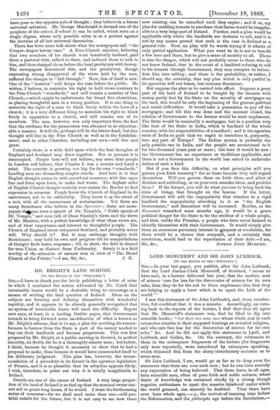MR. BRIGHT'S LAND SCHEME.
[TO MB EDITOR OF THE"SPECTATOR.']
have to thank you for lately publishing a letter of mine in which I combated the notion advocated by Mr. Caird that terminable leases would be a desirable thing to encourage as a means of settling the land question of Ireland. Ideas on the subject are forming and defining themselves with wonderful rapidity, and it appears to be already generally recognized that no system of terminable leases will meet the difficulty. Report now says, at least, in a leading Dublin paper, that Government intends to bring forward some modification of what is known as Mr. Bright's scheme, that is to say, a plan for enabling the tenant- farmers to borrow from the State a part of the money needed to buy out their landlords and become proprietors. This was first proposed by Mr. Bright, at a public meeting in Ireland, in perfect sincerity, no doubt, for he is a thoroughly sincere man ; but rather, I think, because he thought it necessary to show that he had a proposal to make, than because it would have commended itself to his deliberate judgment. This plan has, however, the recom- mendation of a precedent in its favour in the agrarian legislation of Prussia, and it is so plausible that its adoption appears likely. I wish, therefore, to point out why it is totally inapplicable to Ireland.
Entails are one of the curses of Ireland. A very large propor- tion of the land of Ireland is so tied up that the nominal owner can- not sell or grant long leases, if he would. I trust the forthcoming series of measures—for we shall need more than one—will pro- hibit entails for the future, but it is not easy to see how those
now existing can be cancelled until they expire ; and if so, my plan for enabling tenants to purchase their farms would be inapplic- able to a very large part of Ireland. Further, such a plan would be applicable only where the landlords are desirous to sell, and it in not by any means proved that such is the case in Ireland as a. general rule. Now, no plan will be worth trying if it admits of only partial application. What you want to do is not to benefit a few here and there, but to give a sense of security to all. There- is also the danger, which will not probably occur to those who do• not know Ireland, that in the event of a landlord refusing to sell to his tenants through Government, they may conspire to intimi- date him into selling; and there is the probability, or rather, I should say, the certainty, that any plan which is only partial in. its operation will not lessen, but increase discontent.
But suppose the plan to be carried into effect. Suppose a great part of the land of Ireland to be bought by the tenants with money partly lent by the State on the security of mortgages on- the land, this would be only the beginning of the gravest political and social difficulties. It would take a generation to pay off the mortgages ; and till this was done and the account closed, the- relation of Government to the farmer would be most unpleasant. The State would be nominally a mortgagee, but in a position very like that of the State in India, which is landlord of the whole- country, with the responsibilities of a landlord ; and is the agrarian state of India so good that we ought to introduce it, purposely, into any part of t nrope? The Indian system is probably the only possible one in India, and the people are accustomed to it for two thousand years past or more ; but here it would be new : the Government has no experience or traditions applicable, and there is not a Government in the world less suited to undertake duties of such a kind.
But if you face this difficulty, on what principles will you govern your Irish tenantry ? for as State tenants they will regard themselves. Will you govern them on Irish ideas, and allow of division and subletting, or on your own sounder ideas, and prohibit. these ? If the former, you will do what you can to bring back the state of things that brought on the famine. If the latter, Government will add the unpopularity that attaches to a rigid landlord the unpopularity attaching to it as " the English Government," and discontent will be increased. Besides, as the Economist remarked some months ago, it would be a grave political danger for the State to be the creditor of a whole people, and that, unlike the Prussian, a people who have never learned to-- identify themselves with their Government. It would simply give them an enormous pecuniary interest in sr nquest or revolution, for there would be a chance that conquest, and a certainty that revolution, would lead to the repudiation of their debt.—I am,.






































 Previous page
Previous page